- Home
- Michael Chabon
The Final Solution Page 2
The Final Solution Read online
Page 2
“Nazis, was it?” said Shane. He gave his head a moderate shake. “Rotten business. Tough luck for the Jews, when you come right down to it.” The question of whether or not the boy was going to spit out the bit of soup he had dabbed onto his tongue appeared to interest him far more than had the internment of the Jews. The boy frowned, and knit his thick eyebrows together. But the soup remained safely in his mouth, and at last Mr. Shane turned his attention to polishing off his own portion. Parkins wondered if the dull and unpleasant subject were now to be dropped.
“No place for a child, to be sure,” said Shane. “A camp of that sort. Nor, I imagine—” He laid down his spoon and raised his eyes, with a swiftness that startled Mr. Parkins, to the corner of the room where, on top of a heavy iron pole, on a scarred wooden crosspiece, with pages of yesterday’s Express spread underneath, Bruno the parrot gazed critically back at him. “—for a parrot.”
Ah, thought Mr. Parkins.
“I suppose you think a wretched stone hovel in the dullest corner of Sussex is a fine place for an African bird, then,” Reggie Panicker said.
Mr. Shane blinked.
“Please excuse my son’s rudeness,” Mr. Panicker said, with a sigh, laying down his own spoon though his bowl was only half empty. If there had been a time when he reprimanded the steady churlishness of his only child, it predated Mr. Parkins’s tenure in the house. “We have all grown very fond of young Linus and his pet, as it happens. And really, Bruno is a most remarkable animal. He recites poetry, as you hear now. He sings songs. He is a most gifted mimic and has already startled my wife a number of times by counterfeiting my own, perhaps overly vehement, manner of sneezing.”
“Really?” Mr. Shane said. “Well, Mr. Panicker, I hope you won’t mind my saying that between your roses and this young chap with his parrot, I seem to have landed myself in a very interesting household.”
He was watching the bird, head cocked to one side in a way that echoed, no doubt unconsciously, the angle from which Bruno habitually preferred to view the world.
“Sings does he?”
“That’s right. Principally in German, though from time to time one hears snatches of Gilbert & Sullivan. Chiefly bits of Iolanthe, as far as I can tell. Quite startling the first few times.”
“But is it all rote—parroting, as it were?” Mr. Shane smiled thinly, as if to imply, insincerely Mr. Parkins thought, that he knew his little joke was not amusing. “Or is he capable of actual thought, would you say? I once saw a pig, as a boy, a performing pig, that could find the square root of three-digit numbers.”
His gaze, as he said this, flashed briefly and for the first time toward Parkins. This, though it seemed to confirm Mr. Parkins’s hunch about the new lodger, also troubled him. As far as anyone in the neighborhood knew, there was no reason to connect him with the subject of digits and numbers. The suspicion that Mr. Shane had been sent by Certain People to observe Bruno firsthand, Mr. Parkins now considered to have been confirmed.
“Numbers,” Mr. Panicker said. “Oddly enough, Bruno seems quite fond of them, doesn’t he, Mr. Parkins? Always rattling off great chains and lists of them. All in German, naturally. Though I can’t say that he appears to do anything with them that I’m aware of.”
“No? He keeps me from sleeping,” Reggie said. “That’s use enough for me. That’s startling enough for me, all right.”
At this point Mrs. Panicker swept back into the dining room carrying the fish course on a pale green platter. For reasons that had never been articulated to Mr. Parkins but which he felt must have a good deal to do with her otherwise unexpressed feelings about her husband and son, she never joined them for dinner. She cleared away the bowls as Mr. Parkins muttered his approval of the soup. There was something desperate and brave about the landlady’s good cookery. It was like the quavering voice of a bagpipe, issuing forth from a citadel that was invested on all sides by dervishes and infidels on the morning of the day on which it would finally be sacked.
“Excellent soup!” barked Mr. Shane. “Compliments to the chef!”
Mrs. Panicker flushed deeply, and a smile unlike any that Parkins had ever seen there, tiny and pouting, made a brief appearance on her lips.
Mr. Panicker noticed it too, and frowned.
“Indeed,” he said.
“Phew!” said the younger Panicker, fanning away the steam that rose from the platter on which lay a plaice that retained its head and tail. “That fish is off, Mother. It smells like the underside of Brighton Pier.”
Without missing a beat—with a last trace of the girlish smile still lingering—Mrs. Panicker reached across and slapped Reggie’s face. Her son leapt from his seat, a hand to his blazing cheek, and for a moment he only glared at her. Then his hand shot out toward her throat as if he meant to choke her. Before his fingers could find purchase, however, the new lodger was on his feet and had interposed himself between mother and son. Mr. Shane’s hands flew out in front of him and before Parkins quite understood what was happening Reggie Panicker was lying flat on his back on the oval rug. Bright blood sprang from his nose.
He sat up. Blood dripped onto his collar and he dabbed at it with a finger, then pressed the finger against his left nostril. Mr. Shane offered him a hand, and Reggie batted it aside. He got to his feet and snuffled deeply. He stared at Shane, then nodded toward Mrs. Panicker.
“Mother,” he said. Then he turned and went out.
“Mother,” said the parrot, in his soft voice. Linus Steinman was looking at Bruno with the deep affection that was the only recognizable emotion Parkins had ever seen the boy express. And then, in a clear, fluting, tender voice Parkins had never heard, the bird began to sing.
Wien, Wien, Wien
Sterbende Märchenstadt
It was a lovely contralto and, as it issued jerkily from the bill of the gray animal in the corner, disturbingly human. They listened for a moment, and then Linus Steinman rose from his chair and went to the perch. The bird fell silent, and stepped onto the outstretched forearm that was proffered. The boy turned back to them, and his eyes were filled with tears and with a simple question as well.
“Yes, dear,” said Mrs. Panicker with a sigh. “You may as well be excused.”
3
They found him sitting on the boot bench outside his front door, hatted and caped in spite of the heat, sunburnt hands clasping the head of his blackthorn stick. All ready to go. As if—though it was impossible—he were expecting them. They must have caught him on his doorstep, boots laced, gathering his strength for a late-morning tramp across the Downs.
“Which one are you?” he said to Inspector Bellows. His eye was exceedingly bright. The great beak quivered as if catching scent of them. “Speak up.”
“Bellows,” said the inspector. “Detective Inspector Michael Bellows. Sorry to bother you, sir. But I am new on the job, down here, learning the ropes, as they say, and I don’t at all overrate my capacities.”
At this last assertion the inspector’s companion, Detective Constable Quint, cleared his throat and politely directed his gaze toward the middle distance.
“Bellows… I knew your father,” the old man suggested. Head tottering on his feeble neck. Cheeks flecked with the blood and plaster of an old man’s hasty shave. “Surely? In the West End. Red-haired chap, ginger mustache. Specialized, as I recall, in confidence men. Not without ability I should have said.”
“Sandy Bellows,” the inspector said. “Grandfather, actually. And how often did I hear him speak highly of you, sir.”
Not quite so often, perhaps, the inspector thought, as I heard him curse your name.
The old man nodded, gravely. The inspector’s sharp eye detected a fleeting sadness, a flicker of memory that briefly seamed the old man’s face.
“I have known a great many policemen,” he said. “A great many.” He brightened, willfully. “But it is always a pleasure to make the acquaintance of another. And Detective Constable… Quint, I believe?”
He trained his raptor gaz
e now on the constable, a dark, brooding potato-nosed fellow. DC Quint was much attached, as he rarely neglected to let it be known, to the prior detective inspector, sadly deceased but a proponent apparently of the old solid methods of policework. Quint tipped a finger to the brim of his hat. Not a talkative fellow, DC Quint.
“Now, who has died, and by what means?” the old man said.
“A man named Shane, sir. Struck in the back of the head with a blunt object.”
The old man looked unimpressed. Even, perhaps, disappointed.
“Ah,” he said. “Shane struck in the back of the head. Blunt object. I see.”
Perhaps a bit batty after all, thought the inspector. Not what he used to be, as Quint had put it. Pity.
“I am not in the least senile, Inspector, I assure you,” the old man said. He had read the trend of the inspector’s thoughts; no, that was impossible, too. Read his face, then; the cant of his shoulders. “But this is a crucial moment, a crisis, if you will, in the hives. I could not possibly abandon them for an unremarkable crime.”
Bellows glanced at his constable. The inspector was young enough, and murder rare enough on the South Downs, for it to seem to both policemen that there was perhaps something remarkable about a man’s skull being staved in with a poker or a sap, behind a vicarage.
“And this Shane was armed, sir,” DC Quint said. “Carried a Webley service pistol, for all that he claimed to be, and near as we can tell he were, nothing but a commercial traveler in—” He pulled a small oilskin-covered notepad from his pocket and consulted it. The inspector had already learned to detest the sight of that notepad with its careful inventory of deeply irrelevant facts. “—the dairy machine and equipment line.”
“Hit from behind,” the inspector said. “It appears. In the dead of night as he was about to get into his motor. Bags all packed, apparently leaving town with no explanation or goodbye, though only just a week before he prepaid two months’ lodging at the vicarage.”
“The vicarage, yes, I see.” The old man closed his eyes, heavily, as if the facts in the case were not merely unremarkable but soporific. “And no doubt you have, quite literally unadvisedly, since you can have received no sensible counsel in the matter, leapt to the readiest conclusion, and placed young Mr. Panicker under arrest for the crime.”
Though aware of the silent film comedy aspect of their behavior, Inspector Bellows found to his shame he couldn’t prevent himself from exchanging another sheep-faced look with his constable. Reggie Panicker had been arrested at ten that morning, three hours after the discovery of the body of Richard Woolsey Shane, of Sevenoaks, Kent, in the lane behind the vicarage where the deceased had parked his 1933 MG Midget.
“For which crime,” continued the old man, “that lamentable young man in the fullness of time will duly be hanged by the neck, and his mother will weep, and then the world will continue to roll blindly on its way through the void, and in the end your Mr. Shane will still be dead. But in the meantime, Inspector, Number 4 must be re-queened.”
And he waved a long-fingered starfish hand, all warts and speckles, dismissing them. Sending them along their way. He patted down the pockets of his wrinkled suit: looking for his pipe.
“A parrot is missing!” Inspector Michael Bellows tried, helpless, hoping this titbit might in the old man’s unimaginable estimation add some kind of luster to the crime. “And we found this on the person of the vicar’s son.”
He drew from his breast pocket the dog-eared calling card of Mr. Jos. Black, Dealer in Rare and Exotic Birds, Club Row, London, and submitted it to the old man, who did not give it a glance.
“A parrot.” Somehow, Bellows saw, he had managed not merely to impress but to astonish the old man. And the old man looked delighted to so find himself. “Yes, of course. An African gray. Belonging, perhaps, to a small boy. Aged about nine years. A German national—of Jewish origin, I’d wager—and incapable of speech.”
Now would have been the moment for the inspector to clear his own throat. DC Quint had argued strenuously against involving the old man in the investigation. He’s strictly non compos sir, I can heartily assure you of that. But Inspector Bellows was too flummoxed to gloat. He had heard the tales, the legends, the wild, famous leaps of induction pulled off by the old man in his heyday, assassins inferred from cigar ash, horse thieves from the absence of a watchdog’s bark. Try as he might, the inspector could not find the way to a mute German jewboy from a missing parrot and a corpse named Shane with a ventilated skull. And so he missed his opportunity to score a point off DC Quint.
Now the old man had a look at Mr. Jos. Black’s calling card, lips pursed, dragging it across a range of distances from the tip of his nose until he settled on one that would do.
“Ah,” he said, nodding. “So our Mr. Shane came upon young Panicker as he was making off with the poor boy’s pet, which he hoped to sell to this Mr. Black. And Shane attempted to prevent him from doing so, and so paid dearly for his heroism. Do I fairly summarize your view?”
Though this was in short the whole of his theory, from the first there had been something in it—something in the circumstances of the murder itself—that troubled the inspector enough to send him, against the advice of his constable, calling on this half-legendary friend and adversary of his grandfather’s entire generation of policemen. Nevertheless it had sounded a sensible enough theory, all in all. The old man’s tone, however, rendered it as likely as the agency of fairies.
“Apparently there were words between them,” the inspector said, wincing as an ancient stammer resurfaced from the depths of his boyhood. “They quarreled. It came to blows.”
“Yes, yes. Well, I don’t doubt that you are right.”
The old man composed the seam of his mouth into the most insincere smile Inspector Bellows had ever seen.
“And, really,” he continued, “it is most fortunate that you require so little assistance from me, since, as you must know, I am retired. As indeed I have been since the tenth of August, 1914. At which time, you may take it from me, I was far less sunk in decrepitude than the withered carapace you now see before you.” He tapped the shaft of his stick juridically against the doorstep. They were dismissed. “Good day.”
And then, with an echo of the love of theatrics that had so tried the patience and enlivened the language of the inspector’s grandfather, the old man tilted his face up to the sun, and closed his eyes.
The two policemen stood a moment, watching this shameless simulacrum of an afternoon nap. It crossed the inspector’s mind that perhaps the old man wished them to plead with him. He glanced at DC Quint. No doubt abject pleading with the mad old hermit was a step to which his late predecessor would never have been reduced. And yet how much there was to be learned from such a man if only one could—
The eyes snapped open, and now the smile hardened into something more sincere and cruel.
“Still here?” he said.
“Sir—if I may—”
“Very well.” The old man chuckled dryly, entirely to himself. “I have considered the needs of my bees. And I believe that I can spare a few hours. Therefore I will assist you.” He held up a long, admonishing finger. “To find the boy’s parrot.” Laboriously, and with an air that rebuffed in advance any offers of assistance, the old man, relying heavily on his scarred black stick, hoisted himself onto his feet. “If we should encounter the actual murderer along the way, well, then it will be so much the better for you.”
4
The old man settled himself onto one knee. The left one; the right knee was no good for anything anymore. It took him a damnably long time, and on the way down there was a horrible snapping sound. But he managed it and went about his work with dispatch. He pulled off his right glove and poked his naked finger into the bloody mud where Richard Woolsey Shane’s life had seeped away. Then he reached into the old conjuror’s pocket sewn into the lining of his cloak and took out his glass. It was brass and tortoise shell, and bore around its bezel an affec
tionate inscription from the sole great friend of his life.
With a series of huffings and grunts, laboring across twenty feet square of level ground as if they were the sheer icy face of Karakorum, the old man turned his beloved lens upon everything that occupied or surrounded the fatal spot, tucked between the lush green hedgerows of Hallows Lane, at which Shane’s half-headless body had been found, early that morning, by his landlord, Mr. Panicker. Alas that the body had already been moved, and by clumsy men in heavy boots! All that remained was its faint imprint, a twisted cross in the dust. On the right tire of the dead man’s motorcar—awfully flash for a traveler in milking machines—he noted the centripetal pattern and moderate degree of darkening in the feathery spray of blood on the tire’s white wall. Though the police had made a search of the car, turning up an ordnance survey map of Sussex, a length of clear rubber milking hose, bits of valve and pipe, several glossy prospectuses for the Chedbourne & Jones Lactrola R-5, and a well-thumbed copy of Treadley’s Common Diseases of Milch Kine, 1926 edition, the old man went over the whole thing again. All the while, though he was unaware of it, he kept up a steady muttering, nodding his head from time to time, carrying on one half of a conversation, and showing a certain impatience with his invisible interlocutor. This procedure required nearly forty minutes, but when he emerged from the car, feeling quite as if he ought to lie down, he was holding a live .45 caliber cartridge for that highly unlikely Webley, and an unsmoked Murat cigarette, an Egyptian brand whose choice by the victim, were it his, seemed to indicate still greater unsuspected depths of experience or romance. Finally he dug around in the mulchy earth that lay beneath the hedgerows, finding in the process a piece of shattered cranium, stuck with bits of skin and hair, that the policemen, to their evident discomfiture, had missed.
He handled the grisly bit of evidence without hesitation or qualm. He had seen human beings in every state, phase, and attitude of death: a Cheapside drab tumbled, throat cut, headfirst down a stairway of the Thames Embankment, blood pooling in her mouth and eye sockets; a stolen child, green as a kelpie, stuffed into a storm drain; the papery pale husk of a pensioner, killed with arsenic over the course of a dozen years; a skeleton looted by kites and dogs and countless insects, bleached and creaking in a wood, tattered garments fluttering like flags; a pocketful of teeth and bone chips in a shovelful of pale incriminating ash. There was nothing remarkable, nothing at all, about the crooked X that death had scrawled in the dust of Hallows Lane.

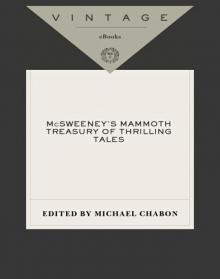 McSweeney's Mammoth Treasury of Thrilling Tales
McSweeney's Mammoth Treasury of Thrilling Tales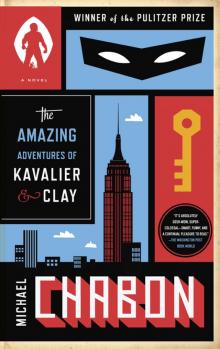 The Amazing Adventures of Kavalier & Clay
The Amazing Adventures of Kavalier & Clay The Yiddish Policemen's Union
The Yiddish Policemen's Union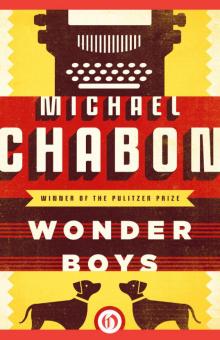 Wonder Boys
Wonder Boys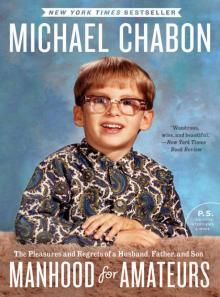 Manhood for Amateurs
Manhood for Amateurs Kingdom of Olives and Ash: Writers Confront the Occupation
Kingdom of Olives and Ash: Writers Confront the Occupation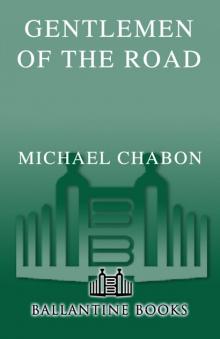 Gentlemen of the Road: A Tale of Adventure
Gentlemen of the Road: A Tale of Adventure A Model World and Other Stories
A Model World and Other Stories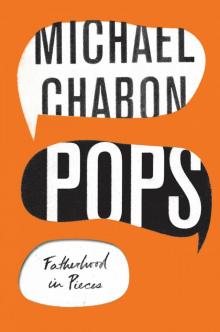 Pops: Fatherhood in Pieces
Pops: Fatherhood in Pieces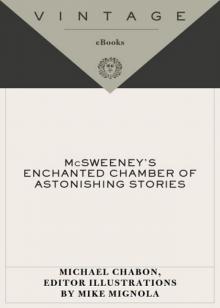 McSweeney's Enchanted Chamber of Astonishing Stories
McSweeney's Enchanted Chamber of Astonishing Stories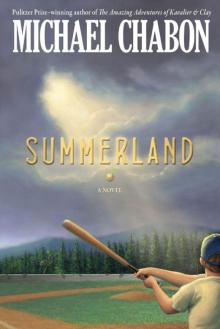 Summerland
Summerland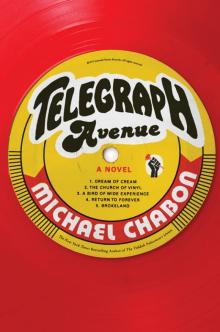 Telegraph Avenue
Telegraph Avenue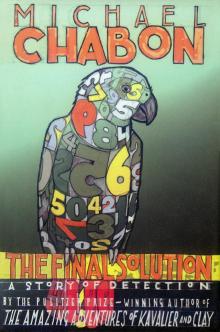 The Final Solution
The Final Solution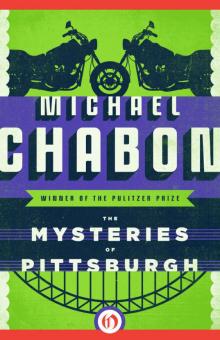 The Mysteries of Pittsburgh
The Mysteries of Pittsburgh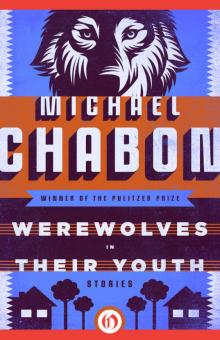 Werewolves in Their Youth
Werewolves in Their Youth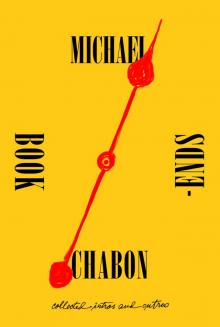 Bookends
Bookends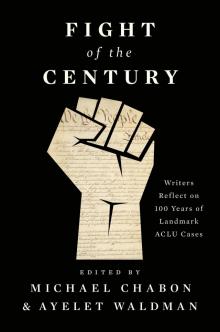 Fight of the Century
Fight of the Century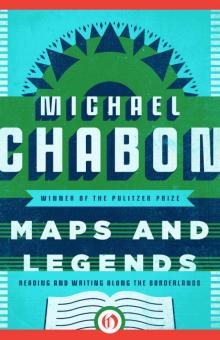 Maps and Legends
Maps and Legends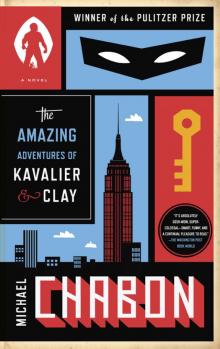 The Amazing Adventures of Kavalier & Clay (with bonus content)
The Amazing Adventures of Kavalier & Clay (with bonus content) Kingdom of Olives and Ash
Kingdom of Olives and Ash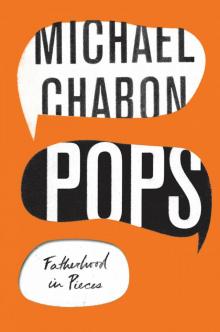 Pops
Pops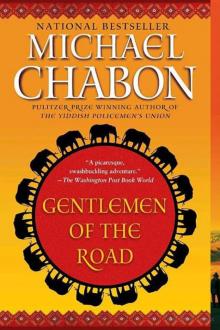 Gentlemen of the Road
Gentlemen of the Road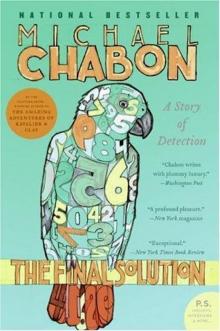 The Final Solution: A Story of Detection
The Final Solution: A Story of Detection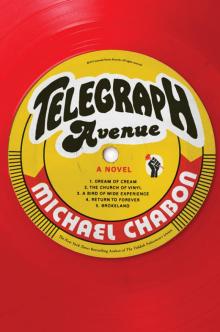 Telegraph Avenue: A Novel
Telegraph Avenue: A Novel